Tibetan Headlines
Apr 8: Border Controls Tighten

The government of the Tibet Autonomous Region (TAR) has announced “strict controls over illegal crossings as the region prepares to celebrate the 70th anniversary of its peaceful liberation in May”, reports China state media globaltimes. Banned activities include approaching the border zone without documents and helping others to cross the border. Also, “carrying or disseminating newspapers, books or electronic products containing content that endangers national security.”
Apr 7: Sikyong Says Goodbye
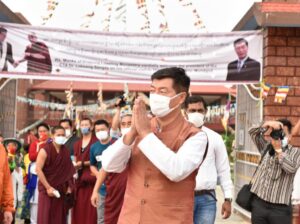
Sikyong Lobsang Sangay, the outgoing President of the Exile Tibetan Government, is on a farewell tour of Tibetan settlements in south India. He addressed people at the Delar Tibetan Settlement in Bylakuppe, and later at Sera Monastery he spoke of his “confidence in having served the Tibetan cause and the aspirations of the Tibetan public wholeheartedly and to the highest of his abilities”.
Apr 6: Monk Detained
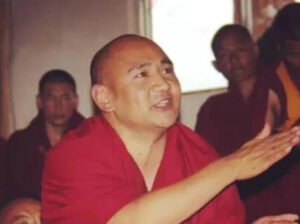
Go Sherab Gyatso, a monk and prominent Tibetan writer, was detained in Tibet in January, reports the Voice of America Tibetan service. He is from Kirti monastery in Ngaba, Amdo and was arrested in Chengdu city. Gyatso has been arrested three times in the past; his current charges are unknown . VOA reports that his family and friends have received a “stern warning” not to share information about his arrest.
Apr 6: Legal Status at Last
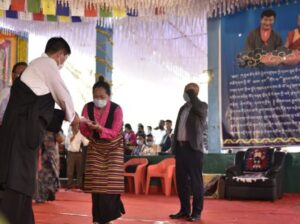
122 Tibetan families in the Kollegal Tibetan settlement in Karnataka in south India have been allocated Record of Tenancy Certificates (RTC). The land they have been farming since 1976 is now leased to the Central Tibetan Relief Committee, giving the tenants security and the right to apply for grants and subsidies from the Indian government, as well as sublease the land. This move follows a long campaign.
Apr 5: Tibetan Flag Raised
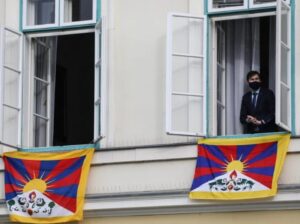
In Budapest, the Tibetan Flag was raised over the I district Town Hall in protest against the recent visit of China’s Defense Minister Wei Fenghe. Ference Garencsér, the district’s Deputy Mayor said, “No country can afford to overlook the violations of human rights committed by China”. He added that Tibetan culture, history and suffering under communist China have made his solidarity and sympathy stronger.
Apr 2: Lobbying in Japan
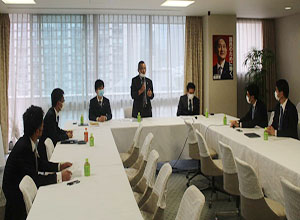
Dr Arya Tsewang Gyalpo, Representative of the Office of Tibet, Japan, has held a briefing for Japanese parliamentarians, saying that Tibet has become a police state, and spoke of the arbitrary detention, imprisonment, torture and death of Tibetans. He appealed to the Japanese government to implement an act similar to the Reciprocal Access to Tibet Act which is now law in the United States.
Apr 1: US Condemns China
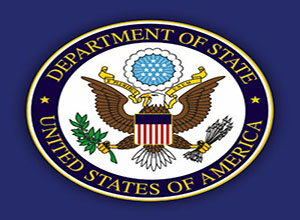
The United States State Department’s annual report on human rights around the world condemns China for severe human rights abuses in Tibet and East Turkestan [Ch: Xinjiang], citing crimes against humanity including imprisonment, torture, enforced sterilisation and increased censorship amid the coronavirus pandemic. It also accuses the Chinese government of genocide against Uyghurs, and persecution of them and members of other religious and ethnic minority groups.
Mar 31: Plans for Tibet
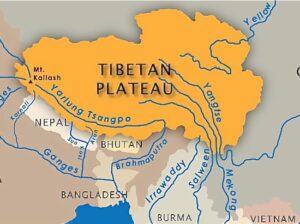
China’s recent “two sessions”, the National People’s Congress Political Consultative Conference focused on its Five-Year Plan which includes plans for Tibet. China intends to continue building a “Modern Socialist Country” The implications for Tibetans include “modernising Tibet,” “Sinicising” religion, “resisting foreign interference” in internal affairs, and “maintaining stability” with a strong military approach. Displacement of Tibetans will continue in the name of “poverty alleviation” and ecological conservation.
Mar 29: Response to Impeachment
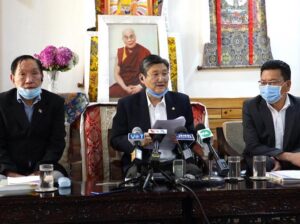
Sonam Norbu Dagpo, the Chief Justice Commissioner sacked last week alongside two Justice Commissioners of the the Tibetan Supreme Justice Commission (TSJC, has responded saying that they “haven’t violated any law” and that the move sets a ‘dangerous’ precedent for the future. An official press release says the three will leave office immediately; they have not done anything ‘unlawful’, they leave out of respect for the constitution.
Mar 26: Impeachment
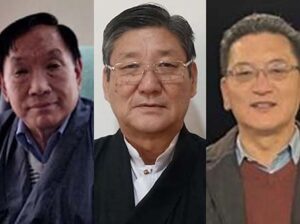
The Tibetan Parliament in Exile (TPiE) has voted to impeach Chief Justice Commissioner Sonam Norbu Dagpo, Justice Commissioner Karma Damdul and Justice Commissioner Tenzin Lungtok, sparking controversy as people label the move undemocratic, or even a “constitutional crisis”. Issues around the conduct of certain parliamentary procedures during the Covid-19 lockdown triggered the row that led to the impeachment. The removal of justices in the Tibetan exile government is unprecedented.
Mar 25: Book Launch
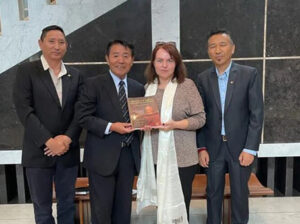
Growing the Tibetan Identity in Australia – Thank You Australia, a book to acknowledge the support of the government and people of Australia to the Tibetan people, and to express gratitude, has been launched by the Tibet Information Office Australia. “Australia has a long history of supporting Tibetan people, starting from the early 1960s”, said Representative Lhakpa Tshoko.
Mar 24: Biking for Tibet
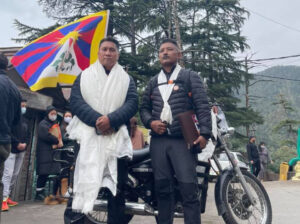
Tsering Yeshi and Chime Tamdin, have set out from McLeod Ganj on a two-month all-India motorbike campaign to send a message to Indian Prime Minister Narendra Modi to confer the Bharat Ratna, India’s highest civilian award, to His Holiness the Dalai Lama. Backed by the five primary Tibetan non-government organisations (NGOs) in Dharamshala, they plan to gather support from Tibetans and supporters around India.
Mar 24: CONIFA Cancelled

The international CONIFA (Confederation of Independent Football Associations Women’s Cup, scheduled to take place in Romania this year, has been cancelled because of the COVID-19 pandemic. This closes the opportunity for the Tibetan team, which was to participate, to play on the international platform. A Tibetan men’s team took part in the 2018 CONIFA cup.
Mar 23: Restriction Continues
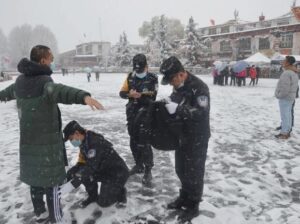
The restriction continues in Lhasa following the March 10 Tibetan National Uprising, with the presence of government police and security personnel said British-based Free Tibet. Groups of more than three Tibetans are banned from visiting the Jokhang temple - the most important temple in the country - and from doing the holy circumambulation of the Kora around the Potala Palace. “The atmosphere is scary and we do not want to take any risk,” said Free Tibet, quoting their local source.
Mar 23: Railway Project Continues
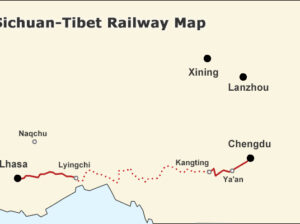
Start on the construction of the two middle sections of the Sichuan-Tibet Railway is imminent, reports China’s official state media. The Sichuan section will be 186 km long; the TAR section 151 km. The report states that the railway has a design speed of 120 to 200 km per hour, climbs to nearly 4,500 meters and more than 90% of the line consists of bridges or tunnels.



